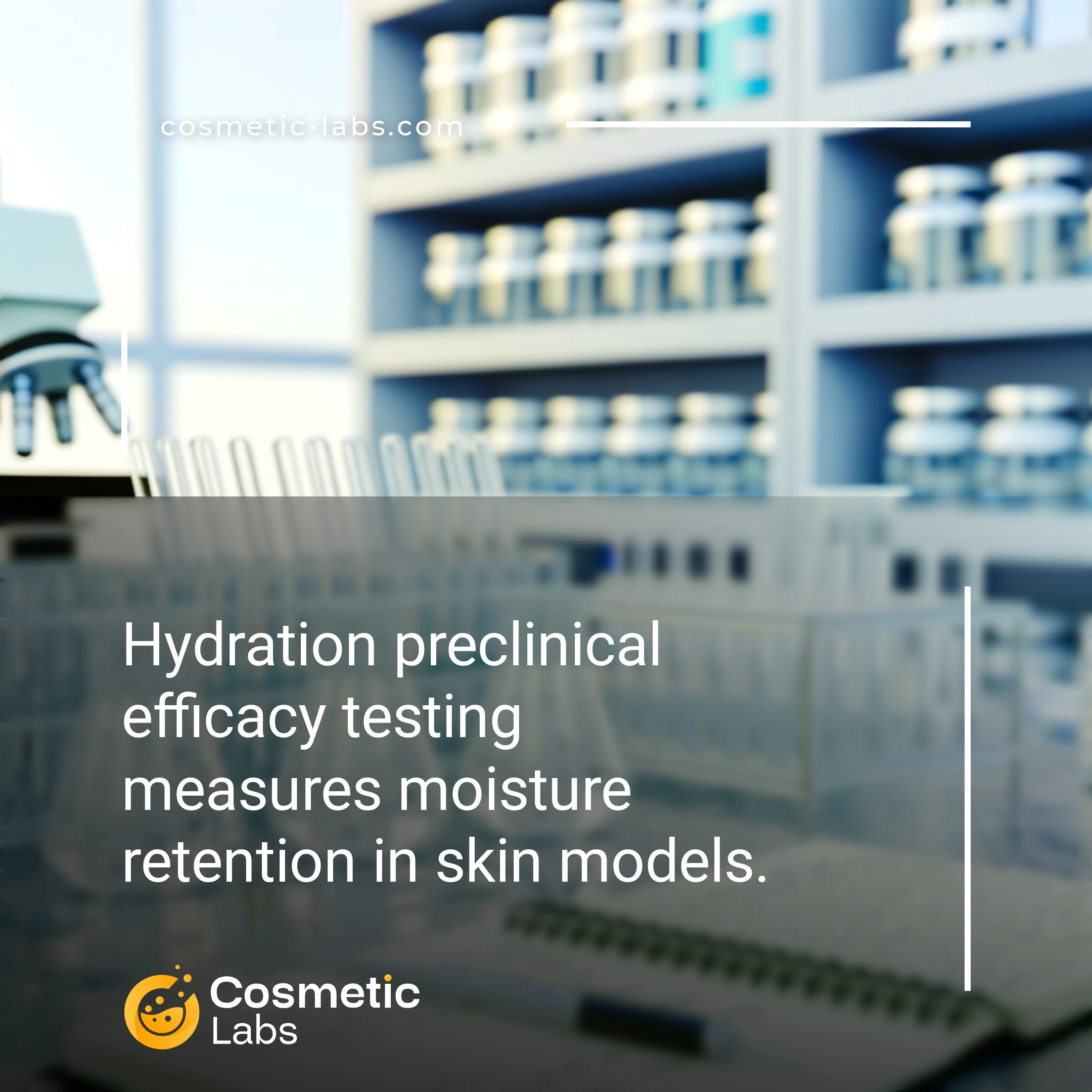Hydration Testing Services for Cosmetic Product Development

What is Hydration efficacy testing?
Hydration preclinical efficacy testing services measure how well your moisturizing formulations work before human trials begin. Labs use corneometer readings and transepidermal water loss measurements to quantify skin hydration levels, proving your claims with concrete data. These tests help you validate moisturizer performance, optimize ingredient concentrations, and build regulatory documentation—all while avoiding costly reformulations later in development.
Why do you need this service?
Cosmetic labs perform moisture retention testing to validate your serum or cream formulations before market launch, measuring skin hydration levels over 24-48 hour periods using corneometry and transepidermal water loss protocols. These services help brands substantiate marketing claims like “provides 72-hour hydration” with documented clinical data that supports regulatory submissions and consumer confidence.
Who provides Hydration efficacy testing services?
All cosmetic labs providing Hydration efficacy testing services
There is no company providing these services at the moment.
Hydration Preclinical Efficacy Testing Services
Hydration preclinical efficacy testing validates your moisturizing formulations before market launch through controlled laboratory assessments. These services measure water retention, barrier function, and moisture delivery across different skin models and conditions.
In Vitro Hydration Assessment Methods
Labs run multiple assays to evaluate your product’s hydrating properties using artificial skin models and cell cultures. Transepidermal water loss (TEWL) measurements track how well formulations prevent moisture escape through barrier disruption studies.
Testing protocols include:
- Corneometer readings for surface hydration levels
- Skin penetration studies using Franz diffusion cells
- Hyaluronic acid retention assays
- Ceramide barrier function tests
Results provide quantitative data on moisture binding capacity and penetration depth within 2-4 weeks.
Comparative Efficacy Analysis
Benchmarking services compare your hydrating ingredients against established moisturizers and competitor products. Labs test concentration-response relationships to identify optimal active levels for maximum water retention without compromising product stability.
Standard comparisons include:
- Glycerin vs. your proprietary humectants
- Ceramide complex effectiveness studies
- Natural vs. synthetic moisturizing factors
These comparative studies help position your product’s hydration claims with scientific backing. Connect with specialized testing labs on our platform to validate your moisturizing formulations with precise efficacy data.
6 subcategories of Hydration efficacy testing services
There are no results matching your search
Practical Applications of Hydration Preclinical Efficacy Testing
Cosmetic labs use hydration preclinical efficacy testing applications to validate moisture-retention claims before human trials, saving brands time and development costs while building regulatory documentation.
Product Development and Claims Validation
Labs conduct corneometer measurements and transepidermal water loss (TEWL) assessments on formulated products using standardized skin models like reconstructed human epidermis. These tests measure hydration levels at 2, 4, and 8-hour intervals to establish efficacy baselines. Brand owners receive quantitative data showing percentage improvements in skin barrier function, typically ranging from 15-40% hydration increases.
Testing protocols also include ingredient compatibility studies using Franz diffusion cells to measure penetration rates. This data supports marketing claims while identifying optimal concentration levels for active ingredients like hyaluronic acid, ceramides, and glycerin.
Regulatory Compliance and Market Entry
Preclinical hydration testing generates the documentation required for regulatory submissions in key markets. Labs perform standardized assays following OECD guidelines, creating reports that satisfy FDA, EU, and international regulatory requirements. These studies typically take 4-6 weeks and cost significantly less than clinical trials.
Testing also supports comparative claims against competitor products. Labs use identical testing conditions to measure relative performance, providing brands with defensible comparative data for advertising and marketing materials.
| Testing Method | Measurement | Typical Timeline | Regulatory Use |
|---|---|---|---|
| Corneometer Analysis | Skin surface hydration | 2-3 weeks | Claims substantiation |
| TEWL Assessment | Water barrier function | 3-4 weeks | Barrier repair claims |
| Franz Cell Testing | Ingredient penetration | 4-6 weeks | Efficacy documentation |
| Skin Model Studies | Cellular hydration response | 5-7 weeks | Mechanism of action |
Ready to validate your hydration claims with preclinical testing? Connect with experienced cosmetic labs on our platform to discuss your specific testing requirements and timeline.

